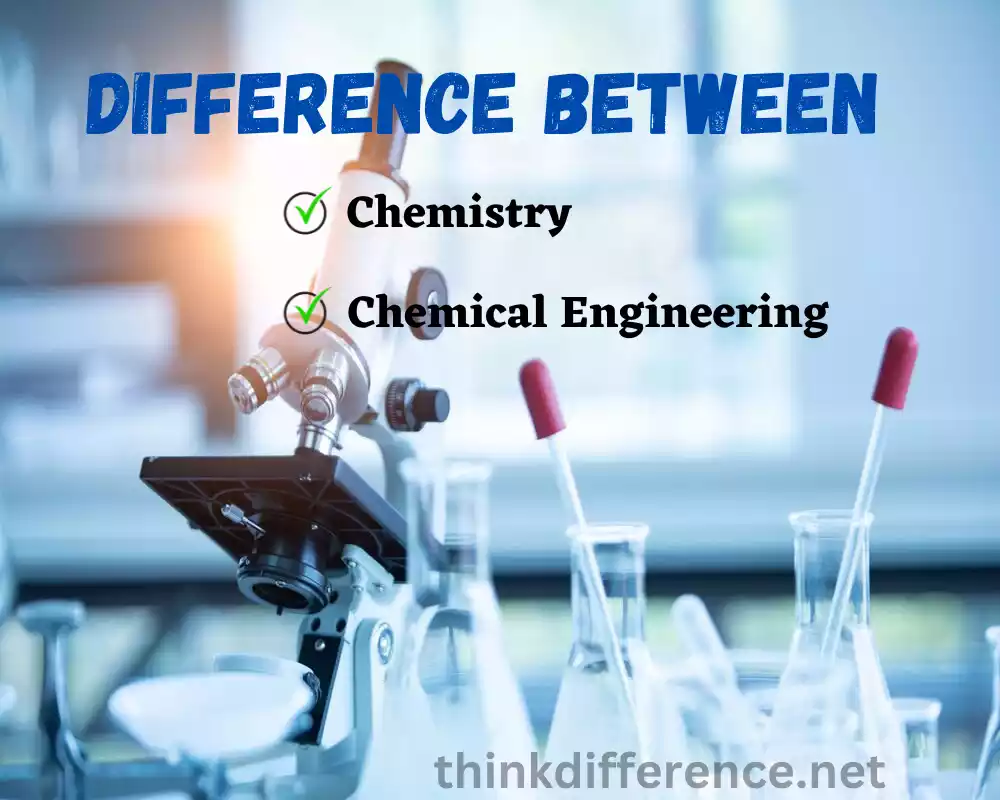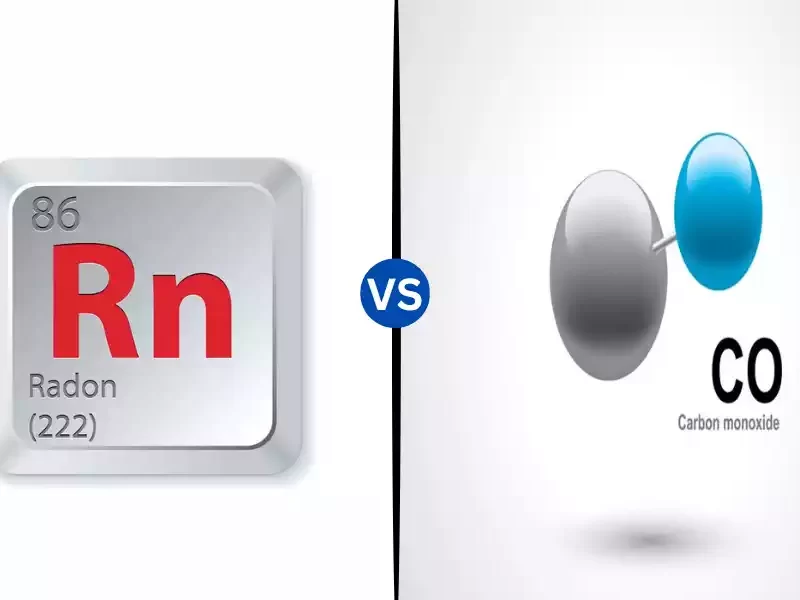Chemistry and chemical engineering share an intimate bond, both playing an essential part in shaping our modern world. In this article we’ll look at their fundamental concepts, applications and differences to provide you with a greater understanding of both disciplines as well as their significance across industries.
What is Chemistry?
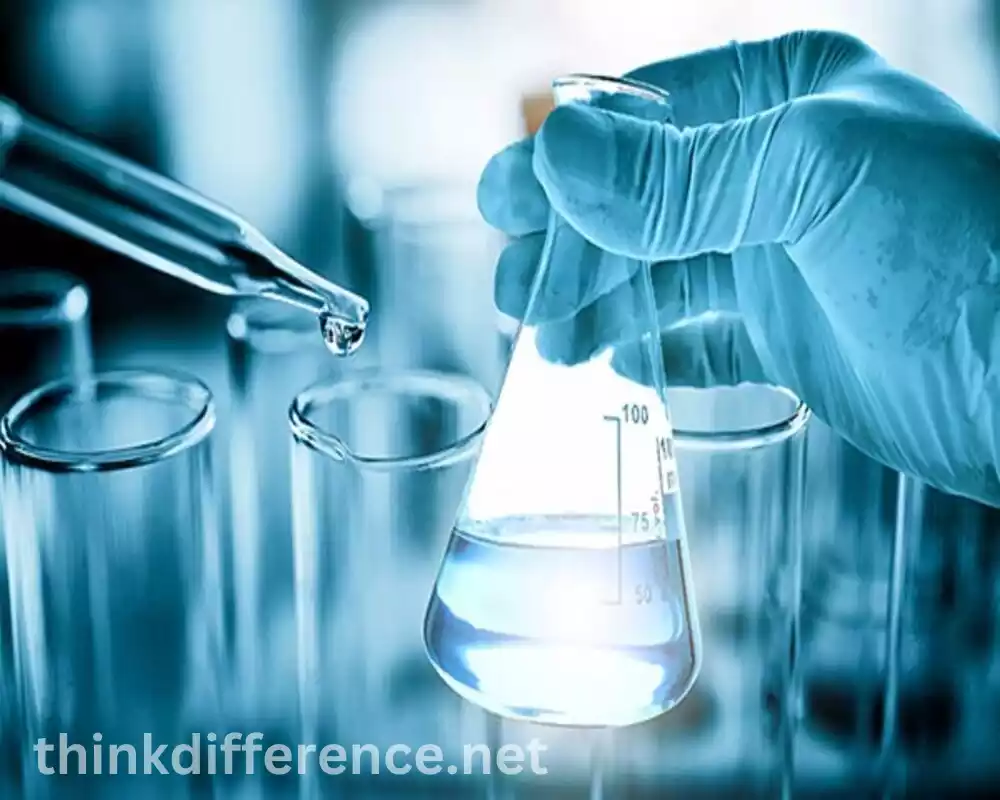
Chemistry is the branch of science concerned with studying the composition, structure and properties of matter. It examines interactions among atoms and molecules. As well as substances it influences other scientific disciplines, including biology, geology and environmental sciences. Chemistry can often be considered “central”, as its findings influence and connect these other scientific fields such as biologist geology or environmental studies.
Chemistry is the study of compounds, mixtures, elements and their reactions, its aim being to understand both their fundamental nature and properties of matter.
Chemists use experimental techniques, analytical tools and theoretical models to investigate and explain chemical processes. Chemists may conduct laboratory-based experiments to measure substances’ composition or analyze reactions, organic, inorganic and physical chemistry as well as analytical chemistry are all subdisciplines within this discipline.
Chemistry has numerous practical uses. Chemists play an indispensable role in many fields such as pharmaceuticals, materials sciences, environmental science and food sciences – the work of chemists is indispensable in creating innovative drugs, designing future materials and understanding environmental pollutants while discovering alternative energy sources.
Branches of Chemistry
Chemistry is an expansive field with numerous branches and subdisciplines that specializes in different areas of matter’s composition, properties and interactions. Here are just a few major branches of chemistry:
- Organic Chemistry: Organic chemistry is the study of compounds containing carbon, including their properties, structures, syntheses and reactions. Organic chemists study organic substances found both within living organisms as well as outside them to gain greater insight into material design as well as understanding physiochemical reactions within living systems.
- Inorganic Chemistry: Inorganic Chemistry refers to the study of compounds and elements without carbon. It involves exploring properties, structures and behaviors of inorganic substances like metals, nonmetals and minerals in their natural state.
- Physical Chemistry: Physical chemistry combines elements from physics, chemistry and mathematics in order to analyze and investigate molecular or atomic level properties and behaviors, such as thermodynamics or quantum mechanics.
- Analytical Chemistry: Analytical chemistry involves applying and developing techniques for the purpose of identifying substances’ composition, structure and properties using methods like spectroscopy or electrochemistry in order to measure or analyze chemical components.
- Biochemistry: Biochemistry focuses on studying biological processes and substances found within living organisms. It investigates biological molecules like proteins and nucleic acids as well as their roles within various processes and systems within living beings.
- Environmental Chemistry: This branch of chemistry examines chemical processes occurring within an environment such as air, water and soil. This discipline examines sources, fates and transportation impacts as well as effects to devise monitoring and remediation plans that improve overall wellbeing in these sectors.
- Medicinal Chemistry: This field deals with the design and synthesis of chemical compounds with potential therapeutic applications, in order to discover new drugs as well as understand their mechanisms of actions, structure-activity relationships and delivery systems.
- Materials Chemistry: Materials chemistry involves the study and production of various types of materials including metals and ceramics as well as polymers and composites. Polymer science plays an essential part in creating new materials with desirable properties for electronics applications as well as energy storage devices, catalysts and other uses.
- Theoretical Chemistry: Theoretical chemical models and computational methods are utilized to predict and understand chemical system behavior. Their aim is to explain complex phenomena, analyze molecular structures and reactions, guide experiments, as well as direct experiments in their entirety.
These different branches of chemistry interrelate and interact, reflecting both its multidisciplinary character as well as the vast array of areas for research and applications that make up this field of science.
Importance of Chemistry
Chemistry plays an integral part of daily life and here are just a few reasons why chemistry matters:
- Chemistry Provides Us With Knowledge About the World: Chemistry allows us to gain an insight into the composition, properties and behavior of matter around us – such as air we breathe or food we consume – helping us better comprehend their interactions and interactions among them.
- Chemistry’s Role in Medicine and Healthcare: Chemistry plays an integral part in pharmaceutical production and medical treatments, from discovering new drugs through synthetic synthesis, understanding their mechanisms of action and optimizing formulations to reduce side effects while increasing efficacy and improving efficacy.
- Environment Conservation: Chemists provide invaluable help for understanding and mitigating environmental problems with its help. Chemistry aids in the implementation of pollution control strategies, waste management plans and climate change studies as well as creating environmentally-friendly technologies, materials and sources.
- Enhancing Agriculture and Food Production: Chemistry plays an essential part in improving agricultural practices such as the creation of pesticides, fertilizers and crop protection methods. Food safety can be guaranteed with detection/analysis of contaminants within foods as well as studying composition & nutritional values of foodstuffs.
- Create New Materials: Chemistry is essential in creating advanced materials with desirable properties, from polymers and metals to ceramics used across industries from electronics, transportation, construction and energy storage.
- Innovating Energy Sources: Alternative energy resources must be developed and optimized, in addition to optimising production and storage technologies for sustainable fuel production methods such as solar cells, fuel cells, batteries or any other viable means.
- Exploring the Frontiers of Science: Chemistry provides the basis of scientific discovery. It leads to breakthroughs and innovations across disciplines like nanotechnology and biotechnology, offering researchers new avenues of enquiry.
- Chemistry Contributes to Safety and Quality: Chemistry plays a pivotal role in improving safety and quality in various industries by providing for identification and analysis of harmful substances as well as development of test methods and regulations for industrial processes, consumer products and medicines.
- Fostering Problem-Solving and Critical Thinking: Chemistry education equips individuals with analytical abilities and problem-solving capacities, teaching them to approach complex issues with scientific methods while equipping them with essential research capabilities and innovative thought.
Chemistry plays a pivotal role in improving our lives, solving global issues and driving technological and scientific innovation across many fields.
What is Chemical Engineering?
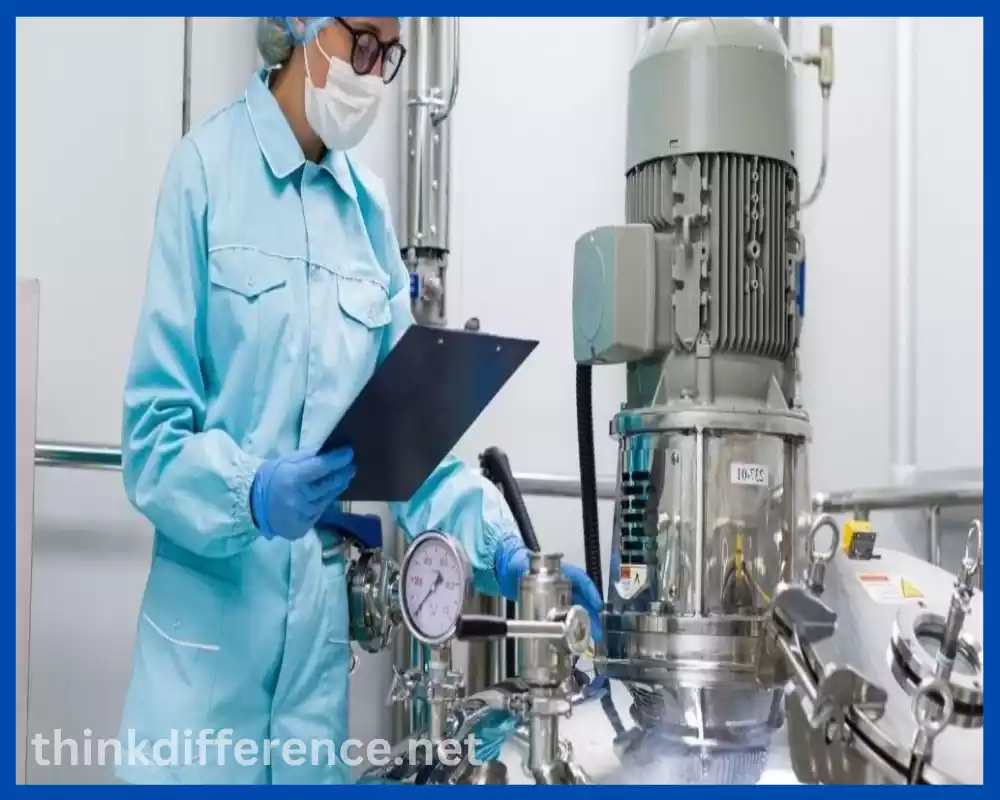
Chemical engineering is an engineering specialty which draws upon principles from chemistry, physics and biology in order to design systems and processes which turn raw materials into useful products. As part of an overall scientific discipline that applies engineering principles in practice to solve industrial issues related to production, operation and improvement of chemical processes.
Chemical engineers specialize in various tasks related to designing and operating chemical plants, developing and implementing innovative technologies and processes, optimizing production output, protecting environmental sustainability and safety as well as guaranteeing sustainable practices in production environments. Chemical engineers play a part in all stages of process from conception and design through construction maintenance operation and beyond.
Chemical engineering encompasses multiple key areas, including mass and energy balances (heat transfer), chemical reaction dynamics, process control, separation processes and process control. Chemical engineers utilize these principles to design cost-effective yet efficient production and processing procedures for materials like chemicals, pharmaceuticals, polymers or fuels.
Chemical engineers work alongside other professionals such as chemists and physicists in order to solve complex interdisciplinary issues, using computer simulations, experimental techniques, mathematical modeling and computer simulations in order to optimize processes while decreasing waste emissions and increasing product quality.
Chemical engineering can be seen across a wide variety of industries, such as petrochemical and energy production. Its applications span food and beverage manufacturing, pharmaceutical production, materials fabrication, environmental engineering and biotechnology. Chemical engineers play an invaluable role in creating sustainable processes by seeking alternative energy sources while offering creative solutions to environmental concerns.
Roles and Responsibilities of Chemical Engineers
Chemical engineers often have numerous roles and responsibilities depending on their industry and job requirements, here are some common ones:
- Process Design and Development: Chemical engineers are involved in the design and development of chemical processes and manufacturing plants. They analyze the desired product, evaluate raw materials and equipment, determine process parameters and create detailed process flow diagrams and engineering specifications.
- Process Optimization and Improvement: Chemical engineers work to optimize existing processes, improve efficiency and reduce costs. They identify bottlenecks, analyze data and implement changes to enhance productivity, energy efficiency and product quality.
- Safety and Environmental Compliance: Chemical engineers are responsible for ensuring the safety of operations and compliance with environmental regulations. Design of safety systems, identification and assessment of potential hazards and the creation of protocols to handle and dispose of hazardous material are the essential duties for these professionals. They also contribute to the development of sustainable and environmentally friendly processes.
- Plant Operations and Management: Chemical engineers may oversee the operation of chemical plants, ensuring smooth functioning, troubleshooting issues, and coordinating with various teams. They monitor process parameters, analyze data and make adjustments to maintain optimal performance and meet production targets.
- Research and Development: Chemical engineers specialize in research and development to produce new products, improve existing ones and create cutting edge technologies. They conduct experiments, study results carefully then collaborate with scientists, chemists and engineers from other fields in order to expand knowledge while driving innovation forward.
- Quality Control and Assurance: Chemical engineers are involved in quality control and assurance processes to ensure that products meet the required specifications and standards. They develop testing protocols, analyze samples and implement quality control measures throughout the production cycle.
- Project Management: Chemical engineers often assume project management roles, overseeing the planning, budgeting and execution of engineering projects. Project managers oversee resources and deadlines, coordinate among multidisciplinary groups and ensure projects meet both budgetary and time constraints.
- Technical Sales and Support: Chemical engineers may work in technical sales and support roles, providing expertise and guidance to customers and clients. They help identify the appropriate products or solutions, offer technical support and address customer concerns or inquiries.
- Research and Academia: Chemical engineers can pursue careers in research institutions or academia, conducting cutting-edge research, teaching and mentoring students. They contribute to scientific advancements, publish research papers and educate future generations of engineers.
Chemical engineers’ roles and responsibilities vary significantly based on their industry, employer and position. Chemical engineers enlist help from specialists from other fields when it comes to solving difficult problems and driving innovation, including chemists, physicists, biologists and environmental scientists.
Applications of Chemical Engineering
Chemical engineering can be found across numerous industries. Here are just a few areas in which chemical engineers work:
- Chemical Industry: Chemical engineers play an invaluable role in the Petrochemical Industry, which produces chemicals and fuels made of petroleum and natural gases. Chemical engineers participate in processes like refining crude oils, manufacturing polymers and plastics production as well as developing new fuel technology.
- Energy Production and Storage: Chemical engineers specialize in developing technologies for energy storage and production. This work often includes projects using renewable energies like solar panels, wind turbines and biofuels, while also creating storage technologies like batteries or fuel cell technologies.
- Pharmaceutical Industry: Chemical engineers working within the pharmaceutical industry specialize in developing, designing and producing medications. This involves formulating drugs as well as optimizing processes, quality ensuring and meeting regulatory compliance.
- Environmental Engineering: Chemical engineers play an essential role in environmental engineering by designing technologies and processes used for pollution control, waste management and remediation projects relating to air and water pollution control. Wastewater treatment facilities; as well as hazardous waste disposal sites.
- Biotechnology and bioengineering: Chemical engineers specialize in biotechnology when applying engineering principles to biological systems, working on projects relating to genetic engineering, bioprocessing optimization, fermentation processes and creating biofuels and enzymes using microorganisms and biological systems.
- Process Industries: Chemical engineers are in high demand across process industries such as food and beverage production or chemical manufacturing, where their expertise ensures efficient operations of large production processes ensuring safe chemical, food product or material production.
- Environmental Science and Sustainability: Chemical engineers make important contributions to Environmental Science and Sustainability by devising technologies and processes which reduce their environmental footprint, such as waste reduction, recycling, renewable energy projects or developing sustainable material products.
- Consumer Products: Chemical engineers specialize in developing and manufacturing consumer goods like cleaning agents, cosmetics and personal care items for public consumption. By optimising formulations and production processes for safe yet cost-efficient production.
- Food and Beverage Industry: Chemical engineers work within the food and beverages sector on processes including processing, fermentation and packaging food products to ensure safe production as well as developing innovative new technologies and processes for future product innovation. They must maintain safety, quality and efficiency standards throughout food manufacturing operations while simultaneously developing innovative new products or processes.
- Nanotechnology and Materials Science: Chemical engineers specialize in materials science and nanotechnology. They create and characterize nanoscale materials while participating in nanomaterial synthesis projects for nanoparticles or composite nanocomposites containing electronic, medical or material applications.
Here are just a few applications of chemical engineering it offers immense versatility to apply their skills across industries – driving technological progress forward with sustainable practices that contribute to an enhanced quality of life for society at large.
Differences between Chemistry and Chemical Engineering
There are various key distinctions between chemistry and chemical engineering that set each apart, here are a few to bear in mind:
- Focus and Scope: Chemistry is the science that investigates matter’s properties, composition and reactions from molecular interactions to its interactions at an atomic and submolecular levels. Chemical engineering employs principles from both fields in order to devise and optimize large-scale processes for producing chemicals and other materials.
- Scale of Study: Chemistry is usually studied on a laboratory scale to gain more of an insight into how matter functions and reacts. It often requires testing small quantities of substances under controlled conditions before studying their reactions in detail. Chemical engineering instead deals with large-scale operations. Chemical engineers specialize in operating chemical plants while designing commercial processes for creating chemicals, materials or products for sale or production purposes.
- Objective: Chemistry’s ultimate purpose is to deepen scientific understanding and knowledge about matter’s properties and behaviors. Discover new insights explain phenomena. Chemical engineering takes this idea one step further by employing scientific principles and knowledge in creating processes to produce chemicals efficiently at cost-effective costs.
- Skill Set: Most chemists possess an impressive skill set in experimental and theoretical chemistry, including laboratory techniques and data analysis. Chemical engineers also possess extensive expertise in both disciplines as they specialize in mass and energy calculations, fluid mechanics and heat transfer among other things.
- Applications and Industries Focus: Chemistry has many applications across various industries such as pharmaceuticals and materials science. Within these disciplines, chemists may specialize in quality control, research and development for each of these fields. Chemical engineering specializes more heavily on large-scale industrial production and manufacturing, typically found working for industries like petrochemicals production or energy generation – though some also work within food processing or materials manufacturing facilities.
- Problem Solving Method: Chemists tend to focus on understanding how chemical reactions take place and on using theory and experiments as tools for solving problems and answering scientific inquiries. Meanwhile, chemical engineers generally utilize engineering principles rather than scientific ones when solving practical issues, often optimizing processes based on factors like cost efficiency and safety considerations.
- Education and Training: Most chemists possess an in-depth background in chemistry. This may lead to them earning degrees like Bachelor of Science, Master of Science or even Ph.D. Chemical engineers can obtain both training in chemical synthesis as well as engineering – they could potentially earn Bachelor’s or higher levels degrees in this area as well as pursue advanced degrees.
Chemical engineers use their knowledge of processes and chemistry to optimize existing large-scale processes while designing new ones while chemists study matter. Both fields play key roles in furthering science and technology advancement and support many industries worldwide.
Similarities of Chemistry and Chemical Engineering
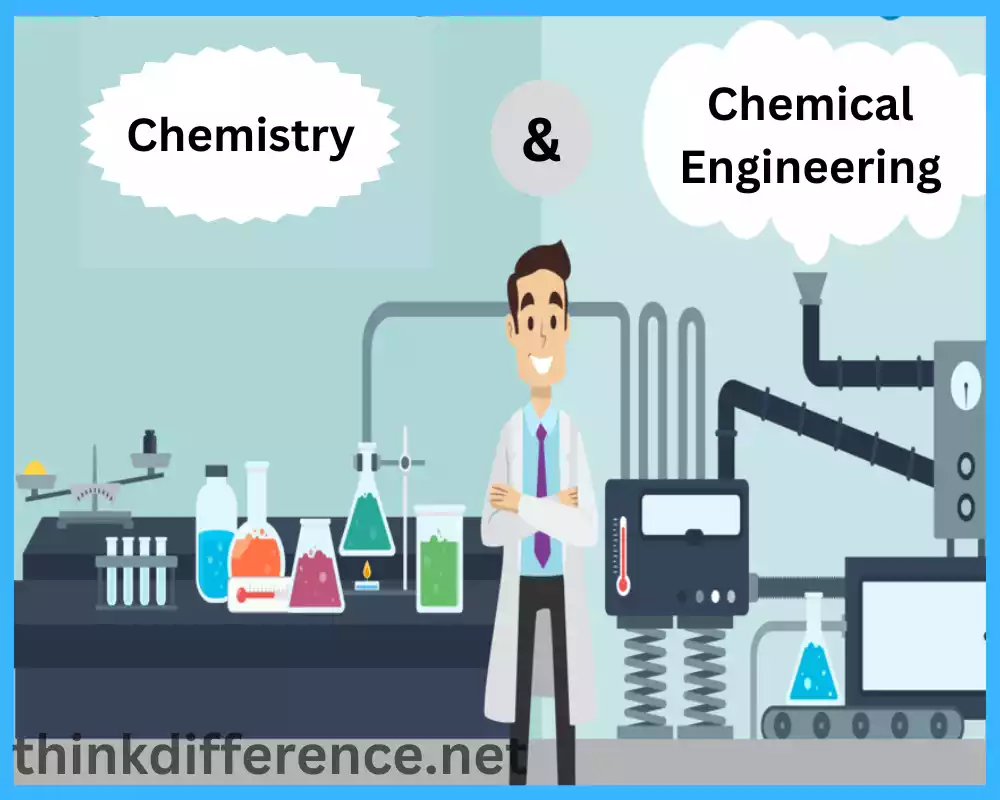
Chemical engineering and chemistry are closely-related fields with many similarities between them. Here are some key similarities:
- Foundation in Chemistry: Chemical engineering and chemistry share an equally strong foundation. Both fields require knowledge of chemical reactions, thermodynamics and kinetics as well as material properties for success.
- Chemical Engineers and Chemists Have Common Knowledge: Chemical engineers and chemists frequently share knowledge in fields like physical chemistry and analytical chemistry, in addition to having an in-depth knowledge of chemical structures, bonds and molecular interactions.
- Laboratory Skills: Chemical engineers and chemists both possess laboratory skills necessary for conducting experiments, analyzing samples, characterizing chemical substances and performing other lab work. Both professions possess expertise with techniques like spectroscopy and chromatography which facilitate laboratory tasks.
- Scientific Methodology: Chemists and chemical engineering professionals alike utilize the scientific method in their daily work lives, devising hypotheses, planning experiments, collecting data and assessing results in order to make scientific advancements.
- Collaboration and Interdisciplinary Work: Chemists, chemical engineers and other scientists often come together in teams on projects or research that requires multidisciplinary approaches, creating new processes or optimizing reaction rates while solving difficult problems at the intersection between engineering and chemistry.
- Understanding of Chemical Processes: Chemical engineers possess an in-depth knowledge of chemical processes, their areas of focus can differ. Chemical engineers utilize this understanding to optimize and design large-scale chemical processes.
- Safety and Environmental Awareness: Both chemical engineers and chemists place great value in being aware of safety and environmental considerations in their work, both knowing of any hazards related to chemicals used during chemical processes as well as safe practices to handle, store and dispose of substances safely. Both are committed to developing eco-friendly technologies.
- Continuous Learning and Professional Development: Chemical engineers and chemists alike engage in continuous learning and professional development programs in order to stay abreast of current developments in their respective fields. These professionals regularly attend conferences, publish papers, join professional organizations or societies and become members of professional societies and associations.
These parallels between chemical engineering & chemistry illuminate their close, yet distinct relationship, while attesting to its multidisciplinary nature. Collaboration among chemical engineers, chemists and other professionals often results in innovative solutions and advances for both fields.
Education and Career Paths in Chemistry and Chemical Engineering
Education and career pathways of chemical engineers vary based on each discipline’s requirements and goals. Below is an overview of common paths taken towards their careers and educations in both fields.
Chemistry:
- Education: Aspiring chemists will require at minimum a Bachelor of Science (B.Sc) degree. Preference will usually go toward majoring in Chemistry or another closely-related field. This undergraduate program offers solid grounding in concepts, laboratory techniques and theoretical principles of this branch of science. Some universities even provide more specialized programs like medicinal or materials chemistry if desired.
- Advanced Degrees: Many careers in chemistry require advanced degrees. A Master of Science (M.Sc) or Doctorate degree allows one to specialize and conduct research in specific areas. Such degrees are particularly valuable to individuals looking for careers in academia, research or higher-level roles within industry.
- Career Paths: Bachelor degrees in chemistry can lead to employment as laboratory technicians, research assistants, quality control analysts or chemical sales representatives. With advanced degrees available there may be opportunities for researchers, chemists or professors. Many opportunities can also exist within pharmaceuticals, materials sciences, environmental science and forensic science industries.
Chemical Engineering:
- Education: Chemical engineering generally requires an undergraduate Bachelor’s of Science (B.Sc) degree or related field. An undergraduate course typically encompasses engineering principles, chemistry and mathematics while offering specialization courses specific to chemical engineering such as process design, thermodynamics fluid mechanics heat transfer engineering as well as chemical reaction engineering.
- Advanced Degrees: Advanced degrees such as an MSc. or PhD can open doors to research, academia and leadership roles within industry; as well as increase your chances for advancement. Such degrees involve coursework, research and specialization within specific areas of Chemical Engineering.
- Career Paths: Chemical engineering opens up numerous career possibilities in industries like petrochemicals and energy, pharmaceuticals and food and beverages manufacturing, materials manufacturing and environmental engineering. Graduates may work as plant operators, researchers, consultants or technical sales and support. Chemical engineers specialize in process design, optimization and safety analysis as well as quality control measures to protect environmental compliance as well as oversee industrial operations management.
Be mindful that career options in chemistry and chemical engineering extend well beyond those listed here. Individuals can explore numerous opportunities depending on their skills, interests and training. Ones career prospects can be enhanced by acquiring practical experience, professional certifications or continuing their education.
Future Trends and Innovations
Chemical engineering and chemistry continue to change and innovate due to technological developments and demands for sustainable solutions. Here are a few future trends and innovations expected to impact this field:
- Green Chemistry and Sustainable Processes: There has been an increased focus on creating environmentally-friendly chemistry processes. Green chemistry principles aim to limit production of harmful substances as well as energy consumption; promote renewable resources and lower production costs through innovations like catalysis or process optimization. Chemical manufacturing will become even more sustainable through innovations made available via catalysis technology or process optimization innovations.
- Advanced Materials: Innovation lies within the design and synthesis of new materials with enhanced properties and functions. One example being advanced polymers and nanomaterials used in electronics, energy storage systems, healthcare applications as well as research focusing on materials with increased strength and conductivity. This area holds immense promise.
- Renewable Energy Technologies: Chemical engineering will play an integral part in driving forward the advancement of renewable energy technologies such as solar cells, fuel cells, batteries and energy storage system innovations that enhance efficiency, cost-effectiveness and sustainability of these forms of power production. As chemical engineers contribute their design, optimization and development expertise for these innovations along with new materials used for storage or conversion processes for these renewable energies they should make significant advances.
- Process Intensification: Process intensification refers to the design and optimization of chemical reactions so as to be more compact, energy-efficient, cost effective and environmentally sustainable. Microreactors and continuous flow systems can assist with this. It aims to decrease footprint, energy usage and waste generated during chemical processes while increasing product quality and productivity.
- Biotechnology and bioengineering: Chemical engineering and biotechnology can work hand in hand to unleash innovation, creating bioprocesses for producing biofuels, pharmaceuticals and biochemicals using microorganisms. Utilization of genetic engineering will facilitate more sustainable production platforms through genetic modification technology as will advances in synthetic biology research.
- Digitalization and Process Automation: Digital technology, data analytics and artificial intelligence have revolutionized the chemical industry. Smart sensors, automation systems and predictive models enable real-time monitoring, optimization and control of processes resulting in greater efficiencies, safety and reliability for operations. Digital tools also aid discovery of new materials or molecules via virtual screening or computer modeling tools.
- Personalized Medicine: Anticipations are that personalized medical treatments that adjust treatment plans based on an individual’s genetic make up will become increasingly advanced, using chemical engineering for targeted drug delivery systems, diagnostic microfluidics and personalized therapies – including innovations like precision manufacturing processes, pharmacokinetic models and drug formulation.
- Circular Economy and Waste Value: As we transition toward a circular economy that maximizes resource reuse while simultaneously minimizing waste production, chemical engineers have an exciting opportunity for innovation in chemical engineering. New processes exist for recycling waste material or upcycling it as upcycled resources. Byproducts may even become valuable resources that are then integrated with renewable feedstocks in chemical production as part of this shift.
Here are a few innovations and trends that are set to transform chemical engineering and chemistry in the coming years. Through research collaboration and technological innovations, chemical engineers will continue making strides forward while meeting global challenges like sustainability, energy, health and materials science.
Summary
Chemistry and Chemical engineering stand at the forefront of scientific and technological progress. From the smallest molecules to large-scale industrial processes, they shape the world in numerous ways. Embracing innovation, sustainability, and collaboration will enable us to harness the full potential of these fields and create a brighter future for humanity.

